Jallianwala Bagh Massacre
Jalianwala Bagh massacre of April 13, 1919 was one of the most inhuman acts of the British rulers in India.
Hundreds of innocent people were killed and thousands injured when General Dyer started firing in a general gathering of Indians against Britishers.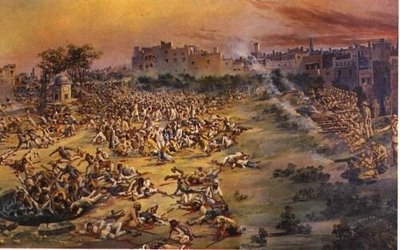
Even today, the bullet marks on walls of the building exists.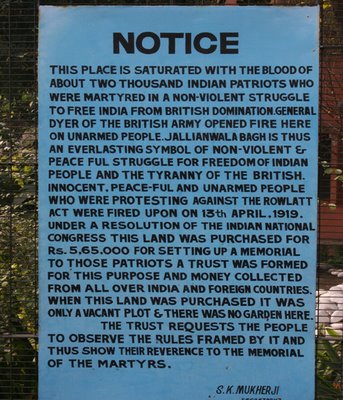


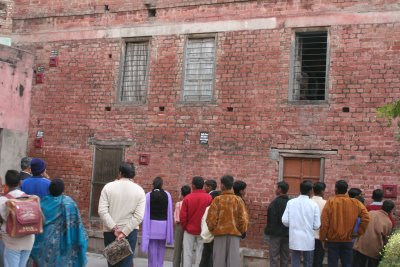
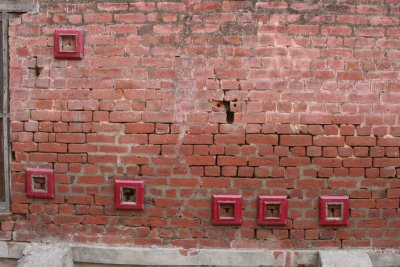



To escape bullets many jumped to death in an open well now known as Martyr’s well.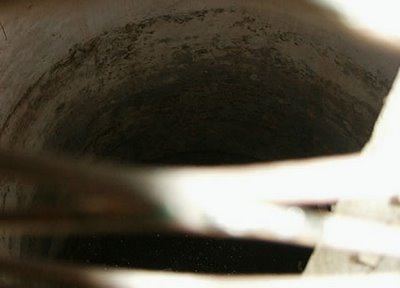


Eternal Flame, was inaugurated by Dr Rajendra Prasad, the first President of the Republic of India, on 13 April 1961.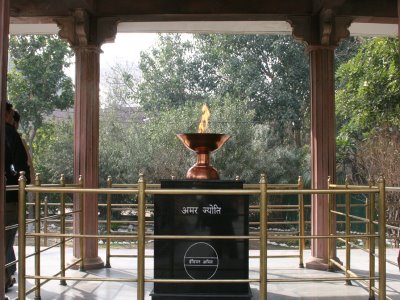

postal stamps :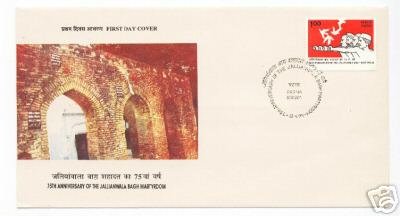
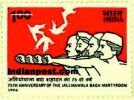
BTW,General Dyer the butcher of Jalianwala Bagh, was murdered by Udham Singh to avenge this barbaric act.
Udham Singh :
A patriot from the Punjab,Udham Singh was deeply influenced by the activities of Bhagat Singh and his revolutionary group. He invariably referred to him as his guru.
Udham Singh came to London in the 1930s as a fighter against foreign colonial rule in India.
The long-waited moment at last came on 13 March 1940. On that day, at 4.30 p.m. in the Caxton Hall, London,
where a meeting of the East India Association was being held in conjunction with the Royal Central Asian Society,
Udham Singh fired five to six shots from his pistol at Dyer.
On 31 July 1940, Udham Singh was hanged in Pentonville Prison in London.
Shaheed Udham Singh, telling the trial court why he killed Dyer
"He was the real culprit. He deserved it. He wanted to crush the spirit of my people, so I have crushed him. "
Udham Singh's Last Words
The British courts were able to silence for long the last words of Udham Singh. At last the speech has been released from the British Public Records Office.
Shorthand notes of the Statement made by Udham Singh after the Judge had asked him if he had anything to say as to why sentence should not be passed upon him according to Law.
Facing the Judge, he exclaimed, 'I say down with British Imperialism. You say India do not have peace. We have only slavery. Generations of so called civilization has brought for us everything filthy and degenerating known to the human race. All you have to do is read your own history. If you have any human decency about you, you should die with shame. The brutality and bloodthirsty way in which the so called intellectuals who call themselves rulers of civilization in the world are of bastard blood...'
MR. JUSTICE ATKINSON: I am not going to listen to a political speech. If you have anything relevant to say about this case say it.
UDHAM SINGH: I have to say this. I wanted to protest.
The accused brandished the sheaf of papers from which he had been reading.
THE JUDGE: Is it in English?
UDHAM SINGH: You can understand what I am reading now.
THE JUDGE: I will understand much more if you give it to me to read.
UDHAM SINGH: I want the jury, I want the whole lot to hear it.
Mr. G.B. McClure (Prosecuting) reminded the Judge that under Section 6 of the Emergency Powers Act he could direct that Udham Singh's speech be not reported or that it could be heard in camera.
THE JUDGE (to the accused): You may take it that nothing will be published of what you say. You must speak to the point. Now go on.
UDHAM SINGH: I am protesting. This is what I mean. I am quite innocent about that address. The jury were misled about that address. I am going to read this now.
THE JUDGE: Well, go on.
While the accused was perusing the papers, the Judge reminded him 'You are only to say why sentence should not be passed according to law.'
UDHAM SINGH (shouting): 'I do not care about sentence of death. It means nothing at all. I do not care about dying or anything. I do not worry about it at all. I am dying for a purpose.' Thumping the rail of the dock, he exclaimed, 'We are suffering from the British Empire.' Udham Singh continued more quietly. 'I am not afraid to die. I am proud to die, to have to free my native land and I hope that when I am gone, I hope that in my place will come thousands of my countrymen to drive you dirty dogs out; to free my country.'
'I am standing before an English jury. I am in an English court. You people go to India and when you come back you are given a prize and put in the House of Commons. We come to England and we are sentenced to death.'
'I never meant anything; but I will take it. I do not care anything about it, but when you dirty dogs come to India there comes a time when you will be cleaned out of India. All your British Imperialism will be smashed.'
'Machine guns on the streets of India mow down thousands of poor women and children wherever your so-called flag of democracy and Christianity flies.'
'Your conduct, your conduct - I am talking about the British government. I have nothing against the English people at all. I have more English friends living in England than I have in India. I have great sympathy with the workers of England. I am against the Imperialist Government.'
'You people are suffering - workers. Everyone are suffering through these dirty dogs; these mad beasts. India is only slavery. Killing, mutilating and destroying - British Imperialism. People do not read about it in the papers. We know what is going on in India.'
MR. JUSTICE ATKINSON: I am not going to hear any more.
UDHAM SINGH: You do not want to listen to any more because you are tired of my speech, eh? I have a lot to say yet.
THE JUDGE: I am not going to hear any more of that statement.
UDHAM SINGH: You ask me what I have to say. I am saying it. Because you people are dirty. You do not want to hear from us what you are doing in India.
Thrusting his glasses back into his pocket, Udham Singh exclaimed three words in Hindustani and then shouted, Down with British Imperialism! Down with British dirty dogs!'
As he turned to leave the dock, the accused spat across the solicitor's table.
After Singh had left the dock, the Judge turned to the Press and said:
'I give a direction to the Press not to report any of the statement made by the accused in the dock. You understand, members of the press?'


























